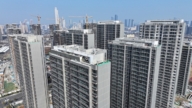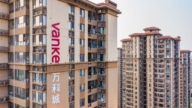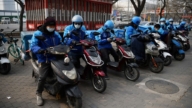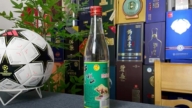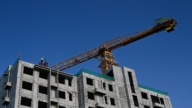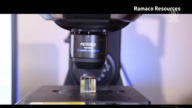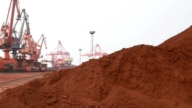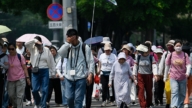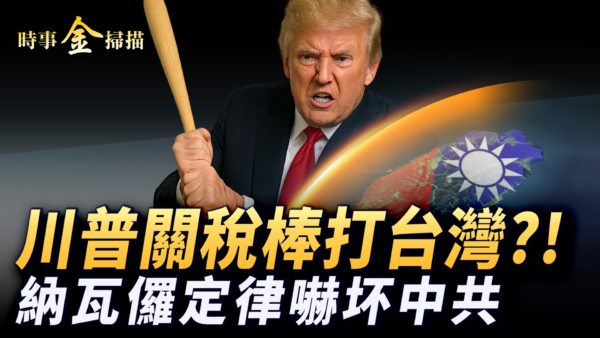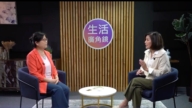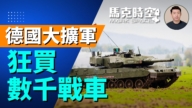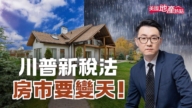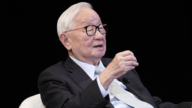【新唐人2012年7月9日讯】中国“人民银行”宣布自7月6号起,下调金融机构人民币存贷款基准利率。其中,金融机构一年期存款基准利率下调0.25个百分点,一年期贷款基准利率下调0.31个百分点。此外,将金融机构贷款利率浮动自由度,增加到30%。这次降息距离6月8号那次首次降息,还不到一个月时间。专家形容中共当局是饮鸩止渴,为维持政权稳定,只好祭出保八大旗,降低失业率。
“中国农业银行”高级宏观分析师王静文,在“中国特色的非对称降息”的文章中说,如果不追究幅度和方式,单就短短一个月内连续两次降息来看,确实反映出当前经济形势的恶化。
文章表示,上半年增长数据要到7月中旬才会公布,但肯定不会太好看,所以高层才会授意央行连续降息。二季度GDP肯定会跌到8%以下,连续第5个季度创出新低应该没有悬念。而,秦皇岛的煤炭库存连续创出新高,用电量、货运量等指标都疲弱不振,也都说明实体经济不容乐观。
据《财经》杂志报导,“北大光华管理学院”教授、经济学家张维迎在“中国企业家夏季高峰论坛”上表示:2008年的强烈经济刺激政策,导致通货膨胀,如今又一个月内两次降息,想办法刺激,如果现在又开始新一轮刺激,大规模的投资,对未来中国经济是灾难性的。
张维迎认为,中国经济经历了20年的快速增长,如今到了一个需要调整的阶段,只有经历一段低速增长,才能转型,才会有更有希望的未来。但是,他表示:政府舍不得休息,一定要跑,可能结果会跑死掉。
另外,美国“普林斯顿大学”社会学博士程晓农指出,中共政府连续降息,很快的又要带来通货膨胀。
程晓农:“中共没有办法真正的把‘反通货膨胀’的政策实施到底,因为它更害怕经济萧条、经济衰落,所以它现在已经开始重新实行四年前造成通货膨胀的‘货币政策’,就是开始大量的投放货币,所以这种情况下,通货膨胀可以预期很快又要回来啦。”
美国南卡罗来纳州立大学管理学教授谢田分析,“放松贷款”可能导致资金流向股市或房市,推高房价和带来通货膨胀。
美国“南卡罗来纳大学”教授谢田:“有裙带关系的,特殊利益集团拿了这些钱,很可能试图从股市里面捞一把,从房市里面捞一把。进一步推高房价。也许有一部分会投入真正的基础建设上,这部分对建筑工人来说觉得很好。对那些建筑承包商也好,建筑材料商也好,他觉得生意好起来了。但对中国老百姓大部分人来说,这是个灾难。我们马上会看到通货膨胀进一步上涨,涨得更高。还是得老百姓买单。”
中共总理温家宝7号在常州调研时说,目前,房地产市场调控仍然处在关键时期,调控任务还很艰钜。温家宝指称,要毫不动摇的继续推进房地产市场各项调控工作,促进房价合理回归。他再一次强调这一点,绝不能让房价反弹。
谢田指出,中共在控制房价问题上也是进退维谷。既不愿意看到房价继续上涨,泡沫越来越大,但又不敢让房市下跌破灭,牵动银行。他说,所谓的“调控”,就是房价不要太高,让民怨太沸腾,也不要太低,让银行破产。
谢田也指出,中共当局连续降息的深一层原因,是民众大规模的反抗行动让中共感到恐慌,甚邡抗暴运动出现的一个新动向,就是由中学生和大学生主导。谢田说,这些年轻人如果跟维权民众的力量结合起来,足以推翻中国共产党,中共只好祭出保八大旗,降低失业率,来维持政权稳定。
采访/刘惠 编辑/秦雪后制/葛雷
People’s Bank of China Cuts Interest Rates to Preserve the Regime?
People’s Bank of China (PBC) announced to cut RMB
benchmark deposit and loan interest rates for financial institutions starting July 6.
The one-year benchmark deposit interest rate will be lowered
by 0.25 percent, and the one-year benchmark loan interest rate will be cut by 0.31 percent.
Also, the loan interest rate floating range
for financial institutions will be increased to 30%.
In less than a month since the previous interest rate cut
on June 8, PBC has cut interest rates again.
Experts comment that the Communist regime
is drinking poison to quench thirst.
In order to maintain stability, the regime wields a policy
to protect its 8% GDP and to lower the unemployment rate.
Wang Jingwen, senior macroeconomic analyst of
Agricultural Bank of China, states in his article entitled,
“The Chinese style asymmetric cut of interest rates”,
that regardless of the magnitude and manner,
two consecutive interest rate cuts within a month
indeed reflect the current deteriorating economy.
The article states that the growth data for the first half
of the year, available in mid-July,
won’t look good and that’s the reason why the authorities
mandated the interest rate cut to the central bank.
The second quarter GDP will certainly fall below 8 percent
and continue the new low for the 5th quarter.
That the Qinhuangdao coal inventory continues its new high,
and both indicators of electricity consumption and cargo
volume are weak have shown the substantial economy is not optimistic.
According to the Caijing magazine, Zhang Weiying,
a professor and economist at Peking University’s Guanghua School of Management,
indicated at the Chinese entrepreneurs summer Summit,
that the heavy economic stimulus policy in 2008 has led to inflation.
Regarding the two interest rates cuts within a month,
if another new simulating policy is pushed, the resulting
large-scale investment will be a disaster to the Chinese economy.
Zhang Weiying believes that the Chinese economy
is in need of adjustment after 20 years of rapid growth.
Only through a period of slow growth will the transition
be possible and the future be hopeful.
However, he says, “the government is reluctant to rest,
and might end up exhausted.”
In addition, Dr. Cheng Xiaonong, a graduate
of the Sociology Department at Princeton University,
indicates the consecutive interest rate cuts
will soon bring inflation to China.
Cheng Xiaonong: “The Communist regime can’t implement
an anti-inflation policy for fear of recession and economic decline.
It reintroduced the monetary policy that caused inflation
four years ago, that is, to input a lot of currency. Inflation is expected soon."
Xie Tian, Professor of Aiken School of Business
at University of South Carolina analyses that
easy loaning may lead the funds to flow into
the stock market or housing market,
pushing up housing prices and bringing inflation.
Xie Tian: “The nepotism and the special interest groups
took the money will likely try to make profit through stock and housing markets.
Housing prices will rise further. Some might invest in real
construction projects and the construction workers will feel good.
The contractors or suppliers will also feel the business is better.
However, it will be a disaster to most Chinese.
We’ll soon see further rise in inflation,
and it is the general public who will have to pay."
Chinese Premier Wen Jiabao spoke on the 7th in Changzhou.
He indicated that now is a critical time for the real estate
market, that regulating the market is an arduous task,
and regulation of the real estate market must continue
to promote the return of affordable housing.
He once again stressed no price rebound.
Xie Tian says that the CCP is in a dilemma
to control housing prices.
It does not want housing to continue to rise and the bubble
to continue growing, but it would not dare to allow the housing market to fall and affect the banks.
He explains that the so-called “regulation" is the housing is not
so high that it would cause boiling grievances, but it is not so low that the bank will go bankrupt.
Xie Tian also points out the fundamental reason
for the Communist authorities to cut interest rates again
is due to the Communist regime panic over the massive
revolts of the people.
The Shifang riot has indicated a new trend of uprising
movements led by students from high schools and university.
Xie Tian says that the combined forces of the youth
and the general public will be sufficient to overthrow the Communist Party of China.
The Communist China was forced to protect its 8% GDP
and reduce unemployment to maintain regime stability.


